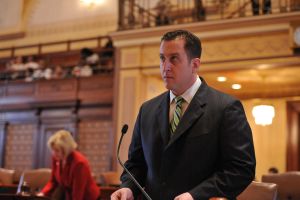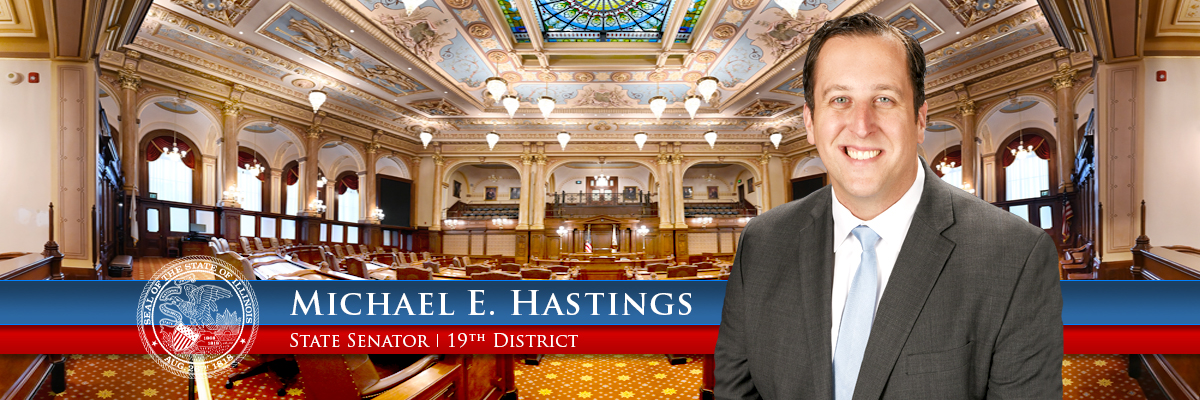- Details
- Category: Press Releases

SPRINGFIELD –State Senator Michael E. Hastings (D-Tinley Park) expressed a willingness to work with the Governor to correct the shortcomings the State has developed over recent years. Hastings noted that in the Governor's address there were some proposals that held merit while others fell short.
Hastings approved of the governor's plan to reinvest in the criminal justice system and Adult Redeploy Program, which helps reduce the recidivism rate in Illinois.
"I've been inside our prisons. I know that they need additional correctional officers to maintain their safety," Hastings said. "Also, programs like Adult Redeploy should be invested in to help steer offenders away from re-entering prison."
- Details
- Category: Press Releases
 SPRINGFIELD – Legislation focused on providing financial relief to critically wounded veterans and their families received the governor’s signature today. The measure increases the property tax exemption for veterans with severe service related-disabilities in order to make their homes more affordable on their fixed income. The proposal also expands the exemption to include homes donated to veterans by charitable organizations.
SPRINGFIELD – Legislation focused on providing financial relief to critically wounded veterans and their families received the governor’s signature today. The measure increases the property tax exemption for veterans with severe service related-disabilities in order to make their homes more affordable on their fixed income. The proposal also expands the exemption to include homes donated to veterans by charitable organizations.
“These veterans have already risked their life for our freedom, they shouldn’t be faced with more financial battles when they return home,” said State Senator Michael E. Hastings (D–Tinley Park), the Senate sponsor of the proposal.
The measure ensures that veterans with severe service-related disabilities who receive specially adapted homes from charitable organizations can access a property tax exemption. That exception is already available to disabled veterans who receive homes built with federal dollars.
- Details
- Category: Press Releases
 SPRINGFIELD – A tragic local death first led Illinois Senator Michael Hastings, a Tinley Park Democrat, to begin researching cyberbullying and ways to fight it.
SPRINGFIELD – A tragic local death first led Illinois Senator Michael Hastings, a Tinley Park Democrat, to begin researching cyberbullying and ways to fight it.
In doing that research, Hastings learned of a heinous form of internet intimidation known as “revenge porn” that slipped through antiquated loopholes in state law.
- Details
- Category: Press Releases
State Senator Michael Hastings (D–Tinley Park) met with Tinley Park Village officials last Tuesday to announce a $700,000 state investment in the Tinley Park Convention Center. The investment, funded by the Department of Commerce and Economic Opportunity, will allow the village of Tinley Park to make needed improvements to the convention center.
“As Tinley Park grows, so too does the need to make smart investments in our tourism industry,” Hastings said. “The convention center draws thousands of visitors to the area each year who spend money at local shops, restaurants and hotels. It’s a positive catalyst to the local economy.”
The grant will fund a comprehensive marketing plan to promote the convention center and help attract potential business. In addition, the investment will help fund multiple infrastructure improvements, including upgrading telecommunications, expanding network capabilities and increasing Wi-Fi access, resurfacing the parking lot, and installing new lights and structural improvements to the public washrooms.
“These upgrades to the venue will ensure the convention center has the accommodations necessary to attract blue-chip shows, conventions and special events,” Hastings said.
Located just 30 miles south of downtown Chicago, the 120,000-square foot Tinley Park Convention Center is one of the Midwest’s premier meeting and convention destinations.
More Articles …
Page 78 of 90


